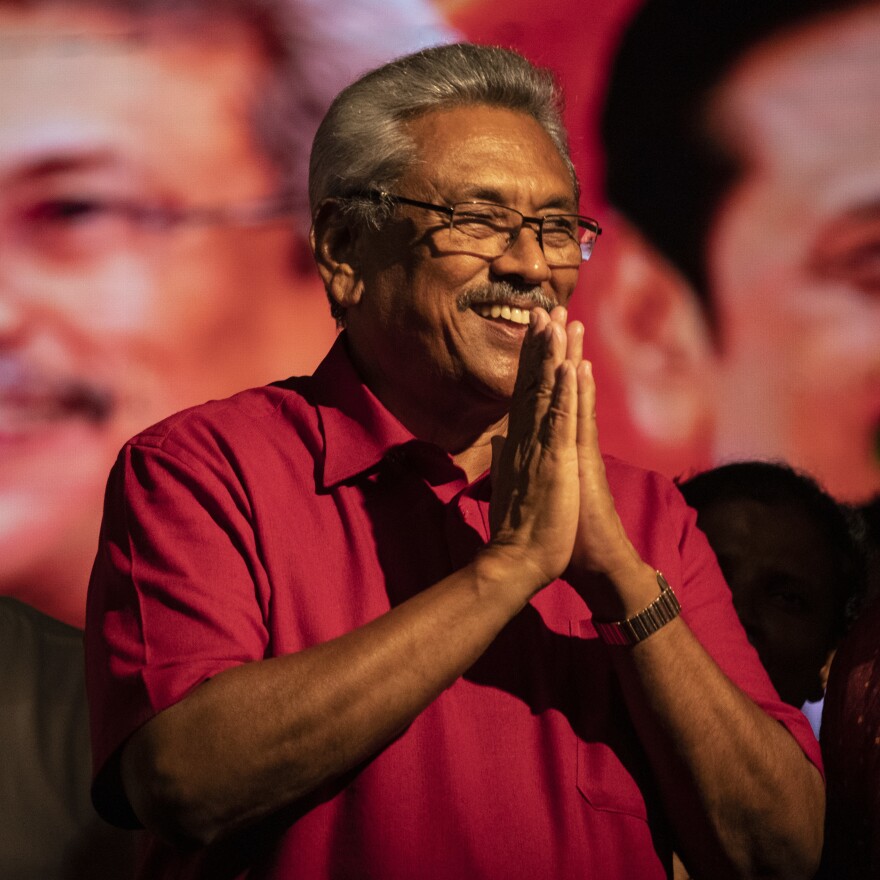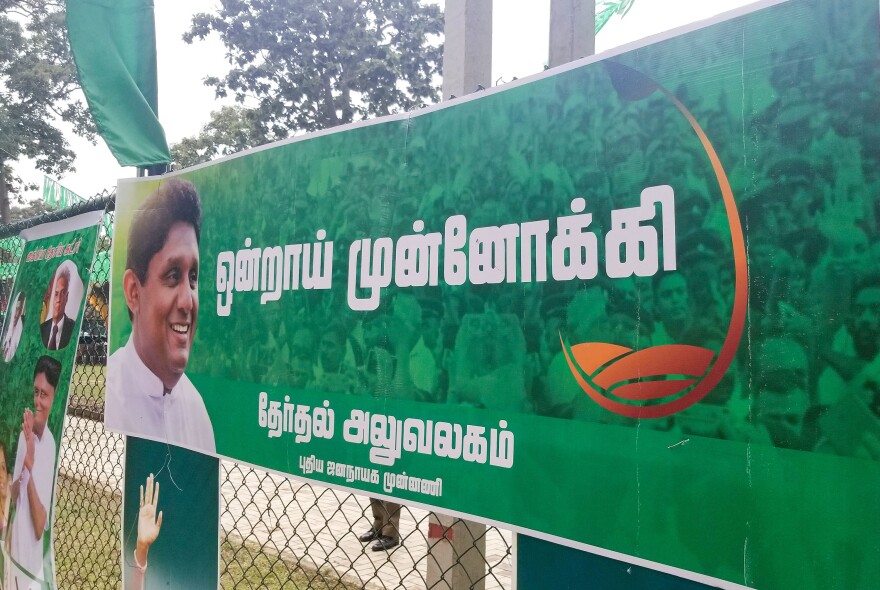On a roadside in northern Sri Lanka, a dozen women in bright-colored saris squat in the shade of an open canvas tent, waving tattered photographs at passing cars. They're school portraits, now yellowing, of their children who disappeared more than a decade ago in the country's civil war.
The women weep and nod as each tells her own son's or daughter's story. Kasipillai Romee was 16. She wanted to be a doctor. Sheeva Kumar was 20. He went to work and never came home. Rajendran Uday was 22 when soldiers came at midnight and took him away.
They're among the tens of thousands of Sri Lankans — mostly ethnic Tamils from the north — who disappeared during the country's 26-year civil war. The conflict ended in 2009, when government troops defeated Tamil separatists. By then more than 100,000 people had died.

No one has ever been held accountable for extrajudicial killings during the war. But the man these mothers say they hold responsible is the former defense secretary, Gotabaya Rajapaksa. He commanded the much-feared intelligence corps while his older brother, Mahinda Rajapaksa, was president, near the end of the war. In that role, Gotabaya Rajapaksa was accused of ordering torture, rape and abductions of ethnic Tamil minorities — and has been sued in U.S. court. (He was a dual U.S. and Sri Lankan citizen, but says he has since renounced his American citizenship.)
Rajapaksa, 70, denies the charges — and is now running for president. In fact, he's the front-runner in Saturday's election.
He represents Sri Lanka Podujana Peramuna, or SLPP, a populist party that has support of Buddhist nationalists.
There are more than 30 other candidates in the race to lead Sri Lanka, a parliamentary democracy, with a strong head of state, similar in ways to France's political system. President Maithripala Sirisena is not running for reelection. Results are expected by Monday.
"We're terrified!" says 55-year-old Rajandran Barathamatha of the prospect of Rajapaksa winning the election. Barathamatha is a Tamil whose son Kumar disappeared in 2007. "Plainclothes agents crept into our home, tied us up and took away our son in a white van. We never saw him again," she says.

Ahead of the election, Barathamatha and more than a dozen other mothers and other relatives of the missing have been protesting on the roadside in Vavuniya, in the northern Tamil heartland, to raise awareness of unsolved disappearances during the war.
For them, Rajapaksa's campaign is dredging up dark memories and stoking fears of more violence. His election would mean a strongman takes power in yet another democracy — this time Sri Lanka, a mostly Buddhist island nation of almost 22 million, just south of India.
When asked about human rights abuse allegations against him, Rajapaksa has laughed them off.
"You are talking all the time about the past. Ask [about] the future!" he told reporters last month in the capital, Colombo. "I am trying to become the president of the future Sri Lanka! We can move on."
For many in Sri Lanka's Sinhala Buddhist majority, Rajapaksa represents a strong pair of hands who can help them move on, and also protect the country against a new threat: Islamist terrorism.
Last Easter, Islamist suicide bombers killed more than 250 people and wounded some 500 at Sri Lankan hotels and churches, including St. Sebastian's Roman Catholic Church in Negombo, north of the capital. Masses have resumed there, but a statue of Jesus is still pockmarked with shrapnel, and the parish priest is still frightened.
"Terrorists and extremists are everywhere," says Father Manjula Fernando. "We need a good leader who is going to eradicate all these people."

When Sri Lankans think of a leader who eradicates his enemies, many think — for better or worse — of Gotabaya Rajapaksa. To many of the country's Sinhala Buddhists, he's a war hero who led government forces to victory in the civil war. A Rajapaksa campaign video features scenes of Buddhist temples — and lots of soldiers with guns.
"The memories are still fresh of what happened during the period when he was defense secretary. There was a lot of impunity and disappearances," says Jehan Perera, executive director of Sri Lanka's nongovernmental National Peace Council, in Colombo. "But for many in the majority, security — and also pride in one's nation — trumps other matters."
Other matters like human rights, welfare, and the question of how much is too much Chinese investment?
When Rajapaksa's brother Mahinda was president, from 2005 to 2015, Beijing became Sri Lanka's biggest lender. Infrastructure projects built and financed by China began popping up all over Sri Lanka, particularly in the Rajapaksas' home district of Hambantota, in the country's south. But when the Sri Lankan government was unable to repay debts to a Chinese state operator, it was forced in 2017 to hand over control to Beijing of a huge port in Hambantota, on a 99-year lease. The deal has raised concerns about Chinese sovereignty on Sri Lankan soil.
Such controversies are not getting much play in this election, despite efforts by Rajapaksa's main rival, Sajith Premadasa, a candidate from the governing United National Party. He also comes from a political family: His late father Ranasinghe Premadasa was president from 1989 to 1993. Sajith Premadasa draws support from moderates, minorities and the youth.

While Rajapaksa is expected to dominate the Sinhala Buddhist vote, Premadasa's challenge will be to bring together disparate groups and boost turnout. About 70% of Sri Lankans are Buddhist, followed by more than 13% Hindu, 10% Muslim and 7% Christian, according to the Pew Research Center. Since the Easter bombings, Muslims have faced particular discrimination and have come under attack by Buddhist extremists.
"Sri Lanka is a multination country. You can't win with one nation. You need a multination combination," says volunteer Sujan Jayasuriya, 35, going door to door for Premadasa's campaign.
He says he's convinced Premadasa will build houses, feed the poor and, most importantly, heal the country after a 26-year civil war.
But Jayasuriya admits he's frustrated that instead of focusing on his candidate's attributes, these doorstep conversations keep turning back to one man — Gotabaya Rajapaksa — and whether a strongman will be elected as Sri Lanka's leader.
Copyright 2021 NPR. To see more, visit https://www.npr.org. 9(MDAxNzg0MDExMDEyMTYyMjc1MDE3NGVmMw004))








